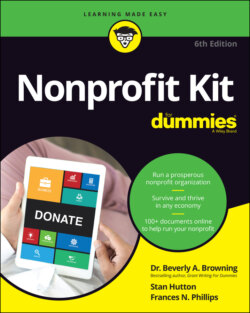Читать книгу Nonprofit Kit For Dummies - Stan Hutton, Beverly A. Browning - Страница 42
Nonprofits and political activities
ОглавлениеNonprofits can’t campaign to support or oppose the candidacy of anyone running for an elected office. However, the stipulations on lobbying for specific legislation are less clear. In the following list, we break down the rules so that you know what you can and can’t do, depending on which type of nonprofit you set up:
Social welfare organizations and labor unions, 501(c)(4): These organizations have more leeway when it comes to legislative lobbying than 501(c)(3) organizations do. They can engage in political intervention activity as long as it isn’t their primary activity. Groups that lobby must inform their members what percentage of dues they use for lobbying activities, and they can’t work toward a candidate’s election.
Charitable organizations, or nonprofits that the IRS considers public charities under section 501(c)(3): These nonprofits may participate in some legislative lobbying if it isn’t a “substantial” part of their activities. The IRS doesn’t define the term substantial, so it determines this question on a case-by-case basis. These nonprofits can generally spend a higher portion of their budgets on lobbying activities if the organization chooses to elect the 501(h) designation (IRS Form 5768). The IRS allows more expenditures for direct lobbying (when members of the nonprofit talk with a legislator about an issue at hand) than for grassroots lobbying (encouraging members of the general public to contact legislators to promote an opinion about a piece of legislation).
Private foundations: Although they, too, are recognized under section 501(c)(3), these organizations may not participate in any legislative lobbying. The only exception to this rule is when pending legislation may have an impact on the foundation’s existence, tax-exempt status, powers, or duties, or on the deductibility of its contributions.
Penalties for engaging in too much political activity can include loss of your organization’s tax exemption. However, going deeper into the details of these laws and reporting requirements is beyond the scope of this book. So if you’re contemplating involving your nonprofit in serious legislative activity, consult an attorney or a tax specialist for advice. One place to find more information is the National Council of Nonprofits. (www.councilofnonprofits.org).
